Keeping your pool open in the winter sounds like a great idea, but it takes a lot of effort, especially if you live in a very cold region.
A frozen pool can lead to many issues, so it’s best to take measures to stop that from happening. One of the most common methods people use is running a pool pump, but is that truly an effective strategy?
Running a pool pump in cold weather will not totally prevent freezing, but it can slow down the rate at which pool water and water in the pipes freeze.
This article will explain why running a pool pump can not prevent freezing in all situations. We will also go over other techniques you can use in combination with running a pool pump, which can give you better results. So keep reading.
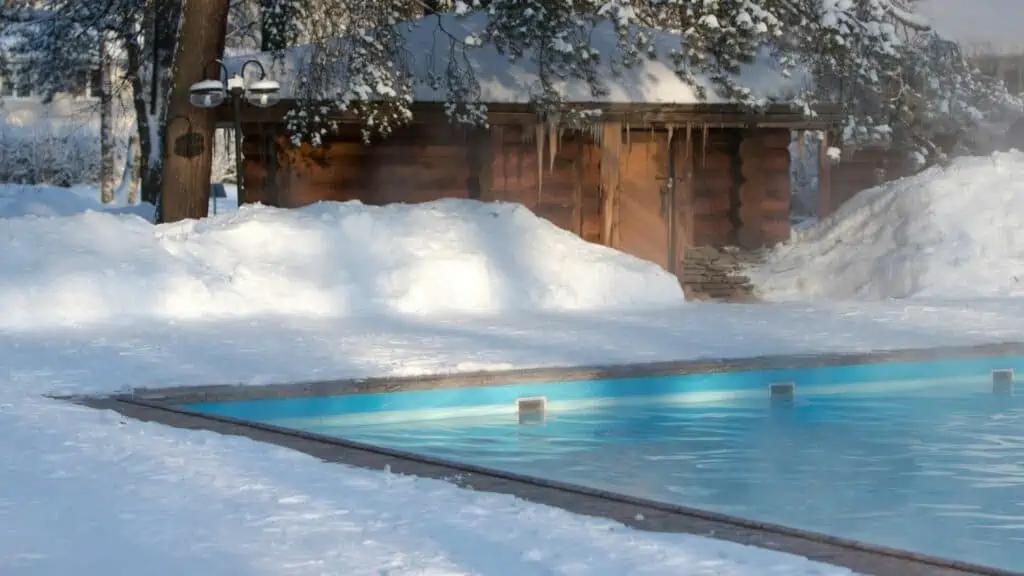
Should I Run Pool Pump When Freezing? Running your pool pump during freezing temperatures is generally recommended, assuming you haven’t winterized your pool. Running the pump helps prevent freezing and potential damage to the pool system.
What temperature does a pool freeze?
Although water freezes when the temperature drops below 32 degrees Fahrenheit, water in the pool’s pipes will not immediately freeze.
To some degree, the water is insulated from the outside air temperature by the pipes themselves, meaning that the temperature may need to drop to 20 degrees Fahrenheit before this happens. If the pipes are underground, this gives even further protection.
At what temp will pool pump freeze? This depends on whether your pool pump has any protection or not. If it is outside and fully exposed to the elements, it will happen at a higher temperature than if it is protected in a pool house.
Keeping the water running can help to prevent freezing even at this temperature.
If you have a salt pool, then the water will not freeze until it reaches a slightly lower temperature than a chlorine pool.
Will running pool pump prevent freezing?
Freezing happens when the temperature of water and pipes stays below 32 degrees Fahrenheit for a few days. Running a pool pump ensures your pool water is moving, creating friction between molecules and providing some heat.
For Example: If you look at a stream in the winter, although everything around the stream may be frozen, including standing water, the running water of the stream does not freeze – except in very extreme weather.
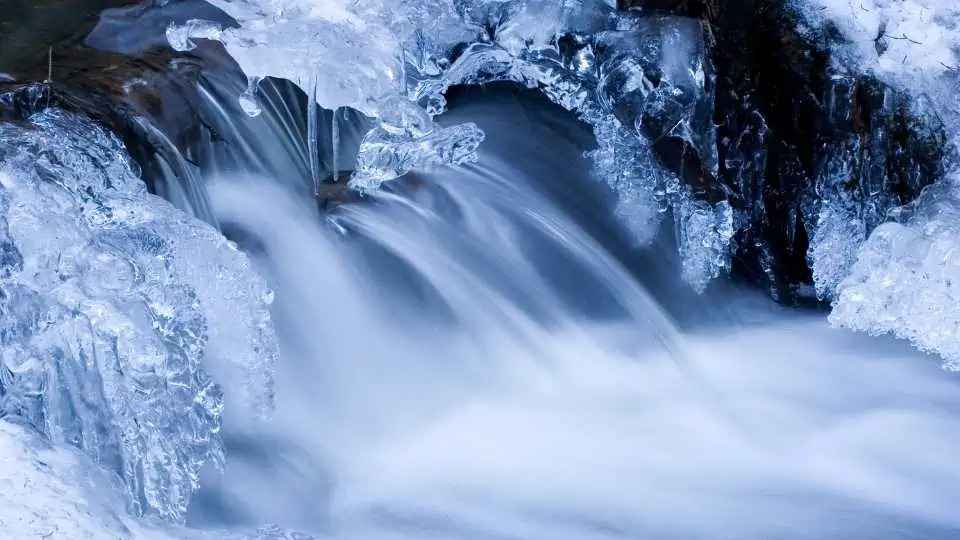
This heat is not prominent enough to prevent freezing forever, but it can delay the process and push it back a couple of weeks.
Any movement requires kinetic energy. For example, whenever you reach out to grab a cup of coffee, your arm uses kinetic energy. The same applies to microscopic molecules. As this happens and each water molecule gains energy, they start moving over each other.
This interaction creates friction and produces heat. However, this heat is insignificant and can only keep water liquid when temperatures are around 30 degrees Fahrenheit. If the temperature goes below this point, the heat produced by the movement of particles won’t do anything.
The cold temperatures will slow down the water molecules and reduce the already small amount of heat produced. This will continue until the water becomes stagnant and begins freezing.
How to protect pool pipes from freezing
While running a pool pump is not a foolproof way to prevent freezing, it can delay the process. Using it combined with other techniques like insulating your pipes, you can keep your pool from freezing throughout the winter.
Here are a few methods you can use to stop your pool water and pipes from freezing:
- Insulate your pipes
- Maintain proper water level
- Install freeze protection timers
- Keep your pool clean
- Pool heater
1. Insulate your pipes
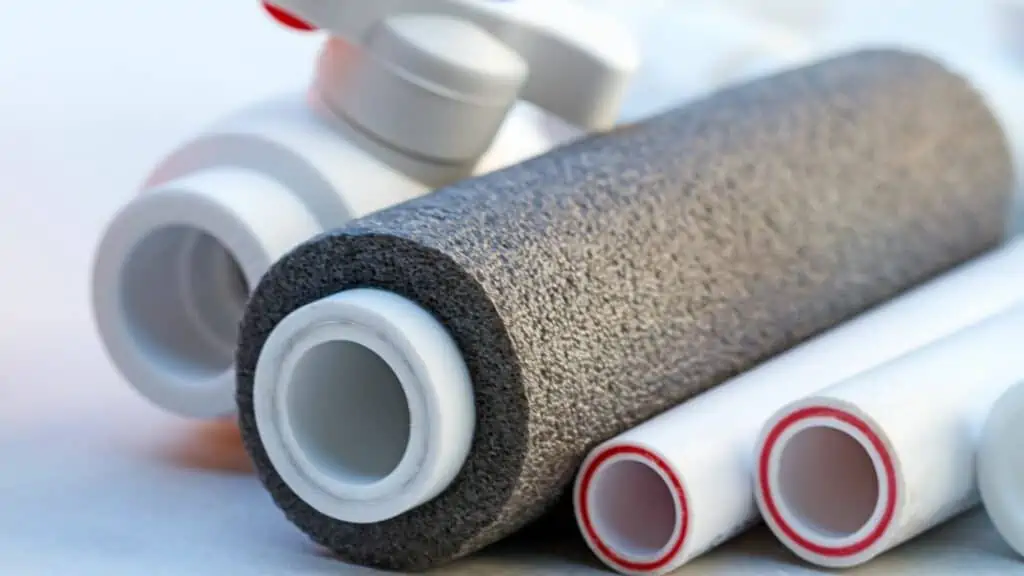
Your pool’s pipes and the water in them only freeze when the temperature drops. Insulating makes it such that they don’t get cold. Using towels or insulation tape protects your pipes and pool water from falling temperatures, which is what you want in the winter months.
Invest in tapes from materials like foil that retain heat to keep your pool components warm. Unlike other materials, they trap heat and distribute it to the pipes.
2. Maintain proper water level
Once you leave your pool open during the winter months, it is essential to take care of it and ensure the water doesn’t freeze. To do so, one of the key things you need to do is ensure the water level is at least halfway up the skimmer.
If it is below the skimmer, your pool system will be deprived of water and easily freeze. So you have to ensure it comes up to the skimmer to keep it moving through the pool filter and stay liquid.
3. Install freeze protection timers
Another great way to keep your pool water from freezing is using freeze protection timers. These devices automatically run the pool system when temperatures get very low. As soon as your pool’s water begins approaching freezing temperatures, your pool’s pump will start working and cycle it.
This will trigger the heat production process we talked about before, where molecules move and create friction. If you don’t live in an area that experiences long spells of temperatures below 32 degrees Fahrenheit, this will often be enough to keep your pool’s water from freezing.
Pool pump freeze protection is excellent for people who want to keep their pool open in the winter months but are too busy to keep an eye on it at all times.
4. Keep your pool clean
Keep your pool clean and remove any leaves or contaminants. This keeps the pipes in your pool from clogging and ensures that there isn’t any build-up. Also, if your skimmers get blocked, the pump won’t be able to move enough water to prevent freezing.
It is essential to ensure you stay on top of your pool’s maintenance. Even though it may be cold outside, you must clean the skimmer baskets daily.
5. Pool heater
This is not a low-cost option, but pool heaters are another great way to prevent your pool from freezing. There are two types: electric and gas. Electric heaters are more eco-friendly than gas heaters but use the outside temperature to work, so you can’t use them for colder climates.
If you live in an area where you’re worried about your pool freezing, gas heaters are a better option. They rely on natural gas or propane and work faster than electric heaters. You can get one for around $1500. The average life span of one of these machines is five years.
Pool heaters channel water from the pool to a heating tank. This tank heats the water and sends it back to the pool. This exchange of cold and warm water makes your pool comfortable during chilly weather.
Not only do they keep the water flowing, which gives you the benefits of running a pool pump, but they also provide extra heat. In the winter months, this extra source of warmth becomes essential in preventing water from freezing.
At What Temperature Will Inground Pool Pipes Freeze
In the winter, inground pool owners often face the concern of frozen pipes. When water within the pool pipes freezes, it can cause damage to the plumbing system. Pool owners must understand at what temperature these pipes may freeze to take preventive measures.
Experts suggest that inground pool pipes can start freezing when the temperature drops below 20 degrees Fahrenheit (-6 degrees Celsius). At this point, the water inside the pipes begins to solidify, posing a risk of pipe rupture and subsequent leaks.
To protect the integrity of their pool plumbing, owners should consider insulating the pipes or implementing a system that circulates warm water through them during freezing temperatures.
Pool Winterization Video Course
Using Swim University’s step-by-step video course, you can close and winterize your pool yourself, saving over $300 a year. The course covers closing both inground and aboveground pools.

Listen to our Pool Winterization Podcast to find out more:
Don’t cover your pool heater with a blanket or insulation
You should avoid covering a pool heater with a blanket or insulation for two reasons. Firstly, doing so will lead to a build-up of moisture. Pool heaters are electronic devices so that this moisture can harm them.
It can cause the coils in the heater to deteriorate and the burner component to get rusty. These compartments are essential to your heater’s proper functioning; moisture can damage them severely.
Secondly, the heater could turn on by itself, or someone else could turn it on accidentally while the cover is still on. If this happens, the heat pump won’t be able to access the proper airflow it needs to work efficiently.
The machine won’t work correctly without fresh air in and flue gases flowing out. Instead, it will get damaged, and you must pay a lot for repairs.
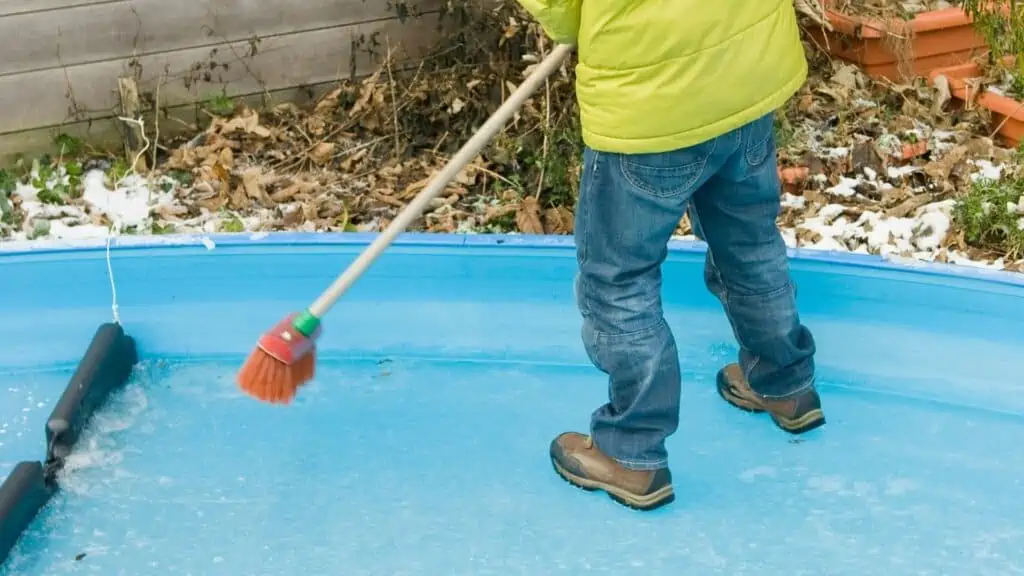
Can I turn off my pool pump in the winter?
During the winter season, it is common for pool owners to wonder do I need to run pool pump in winter.
The answer to this question depends on various factors, such as the climate, location, and specific circumstances of the pool.
In regions experiencing freezing temperatures, if the pool has not been closed and the pump and pipework are drained, it is generally recommended to keep the pump running throughout the winter. This is because the continuous circulation of water helps prevent freezing and potential damage to pool equipment.
Final thoughts
While running a pool pump cannot prevent a pool from freezing, it can somewhat delay the process. This is because the movement of water molecules creates a small amount of heat.
This heat is insignificant in super-cold regions. Still, it can be done if you live in a slightly cooler area where temperatures rarely go below 32 degrees Fahrenheit.
If you happen to live in an area that experiences below-freezing point temperatures regularly, running a pool pump alone will not solve your issue. You must invest in a supplementary technique to ensure the water in your pool stays liquid.
You can do a few things, including insulating your pipes, maintaining proper water levels, installing freeze protection timers, keeping your pool clean, and purchasing a water heater. Pick the most convenient method for you, depending on how cold your home gets.
Summary
During the winter season, it is important to address the freeze protection needs of your pool to ensure its proper functioning and longevity. One crucial aspect is determining whether you need to run your pool pump during this period.
Hayward pool pump freeze protection features offer an effective solution for preventing pool freeze. By incorporating a freeze protector for your pool, you can safeguard it against the potentially damaging effects of freezing temperatures. Additionally, proper maintenance and monitoring of your freeze control for pool pumps will be vital in this endeavor.
In the case of salt water pools, the freezing point is lower compared to traditional chlorine pools. Nevertheless, they can still freeze, and taking necessary precautions becomes crucial. To prevent pool water from freezing, you can consider using pool covers and covering pool equipment. By following these preventive measures, you can protect your pool from freezing and maintain its condition throughout the winter.
Related articles
Should you remove pool steps for the winter?
How to close an above ground pool

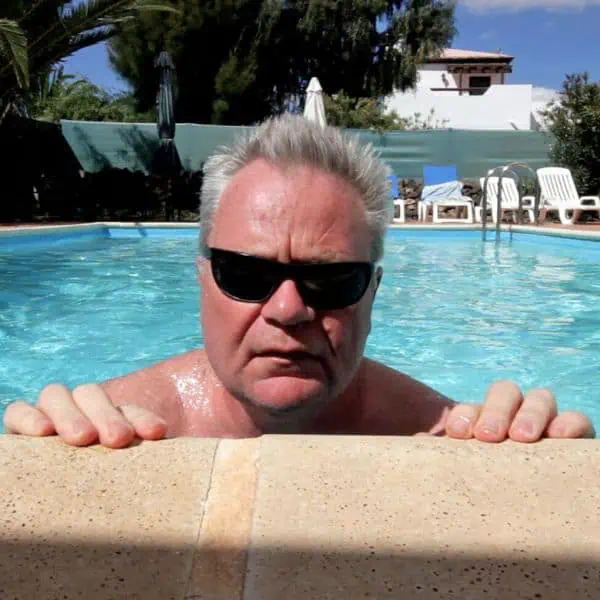
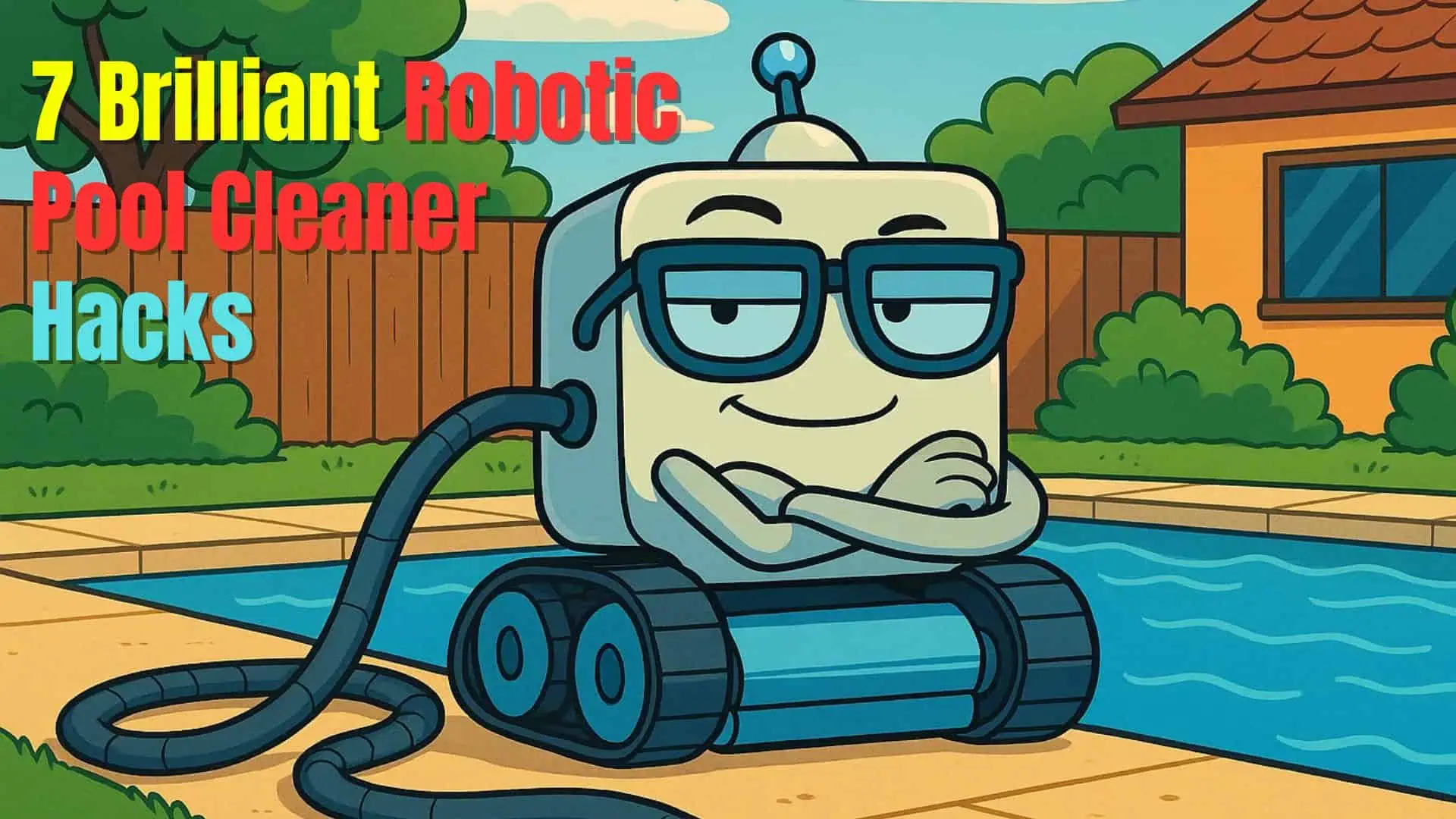


Leave a Reply